Worried about your Geranium Leaves Turning Yellow & Brown? Here are the possible reasons and some solutions for you!
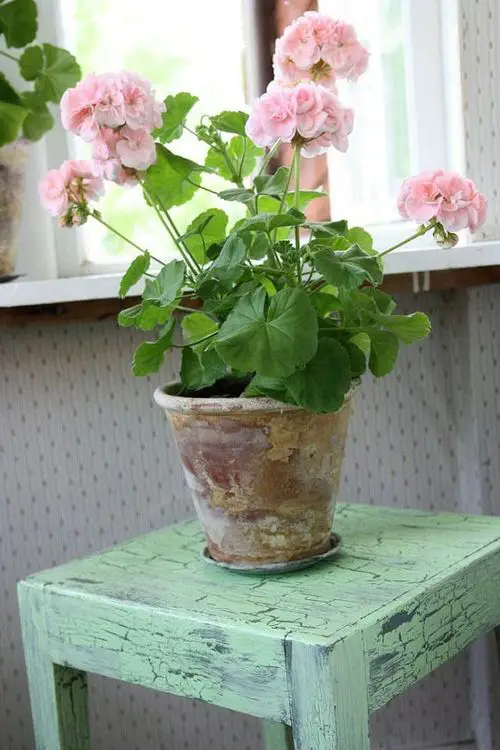
It could be frustrating to see Geranium Leaves Turning Yellow & Brown. Whenever it happens, the obvious thing to ask is why it is happening? Is there any solution to the problem? Fortunately, yes! Let’s have a look at them in detail.
Here’s all you need to know about growing Geranium!
Why Your Geranium Leaves are Turning Yellow & Brown?
If you are growing a true Geranium, then it won’t be exposed to such problems as the plant is hardy and pretty much disease and pest-resistant as compared to the Pelargonium. These plants could grow up at a much faster rate but the underside of the leaves naturally turn yellow before they die and finally fall off the plant.
Check out some amazing tips to make Geranium bloom here
Reasons for Geranium Leaves Turning Yellow & Brown
1. Overwatering
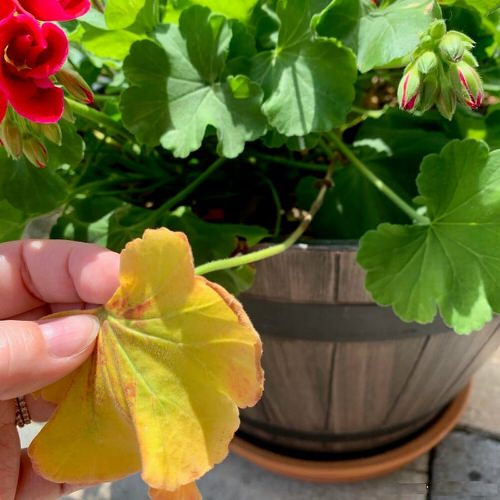
Overwatering the plant can make its foliage yellow. Avoid watering the plant excessively and only do it only when the topsoil feels a bit dry to touch.
2. Underwatering
Geraniums are drought-tolerant but that doesn’t mean you end up keeping them dry. Keep a close tab at the moisture levels of the soil by touching the top 1-2 inches. Failing to do this and not watering the plant for long spells will make the leaves yellow and pale.
3. Sunlight
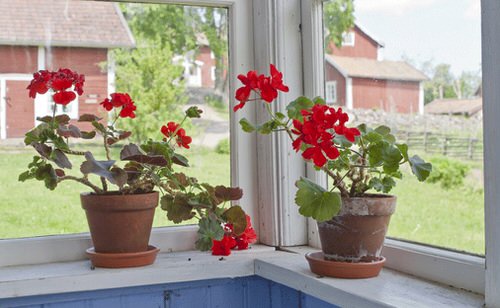
This plant loves to be in sunlight. If you will keep it in a dark spot, or at a location that gets little to no sun, then it will make its leaves yellow.
It is best to place the plant at a spot that receives 2-3 hours of direct morning sunlight.
4. Cold Snaps
Cool snaps could also be one of the reasons behind the leaves turning yellow, especially when the weather is cool and wet for a longer period of time. Even light freeze could be brutal to your Geraniums.
Avoid keeping the plant near windows where they could catch cold drafts of air. Keep them away from AC vents, too. If you live in a cold region, covering the pot with bubble wrap will help.
5. Not Fertilizing the Plant Properly
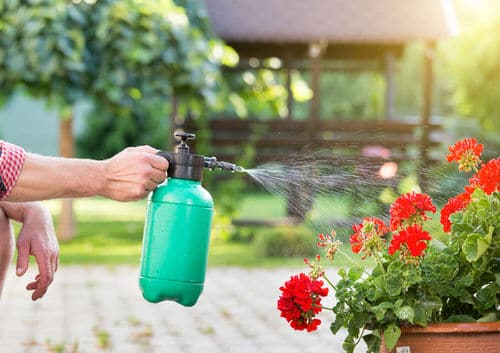
Use a balanced, water-soluble fertilizer once in 4-6 weeks. If you have used regular garden soil for growing the plant, then it might not get proper nutrients to grow effectively and this will take its toll on the foliage, making it yellow.
Geranium leaves could also turn yellow if they suffer from a magnesium deficiency. It directly impacts the chlorophyll that is responsible for the green foliage. Go for a magnesium-rich feed and follow the instructions on the label.
Overfertilization might also be the reason that might be making the plant’s foliage turn yellow or brown at the edges. Always fertilize it according to the instructions on the label. Do not feed the plant in winters.
6. Compact Soil
If you are not able to figure out the exact problem that’s making the leaves of the plant yellow, then compact soil might be the culprit. It is a good idea to till the soil and add some compost if you notice yellow foliage. Adding an inch of shredded leaf mulch or wood chips will greatly help, too.
Take the plant out of the pot and give the roots a thorough inspection. Snip away the damaged ones along with yellow and brown leaves. Re-pot the plant using a fresh and well-draining growing medium.
7. Herbicide Injuries
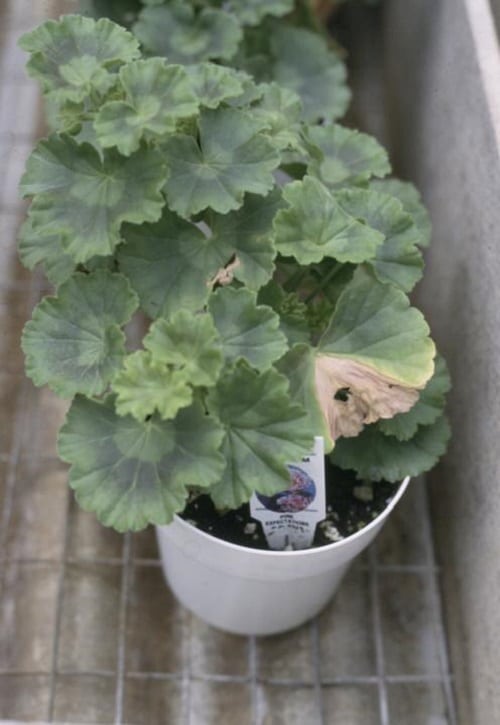
When weeding around geraniums, it’s safer to weed manually. Not all herbicides kill geraniums but they will cause a bleaching effect on the foliage.
The safer approach is to use mulch, which prevents you from having to resort to chemical herbicides.
Geranium Diseases
Here are some diseases that may cause the leaves to turn yellow or brown:
- Bacterial Blight: It attacks the undersides of the leaves, and results in brown and yellow spots and wilting. If you do not treat this it could also cause stem rot and kill the plant. Always purchase disease-free plants to avoid this.
- Bacterial Leaf Spot: It happens when the foliage gets unnecessarily wet. Avoid watering the plant from above and do not wet the leaves.
- Southern Bacterial Wilt: Symptoms of Southern Bacterial Wilt are the same as Blight, only this disease always starts at the soil line, and progresses upwards causing discoloration as it goes. Cut the affected leaves to prevent them from spreading further.
- Viral Infections: There are around 15 known viruses that can affect geraniums, causing the leaves to turn yellow. These are trickier for growers as geranium viruses can take as long as three weeks to show any symptom of an infection. If you notice these, it’s best to isolate the plant to prevent spread.



This was very helpful. Thank you
I may haveoverwatered eventhough its very hot here, there is a drainage hole but I see mold there
They are blooming well but I don;t want to lose them. Shoud I let them dry out or what do you suggest